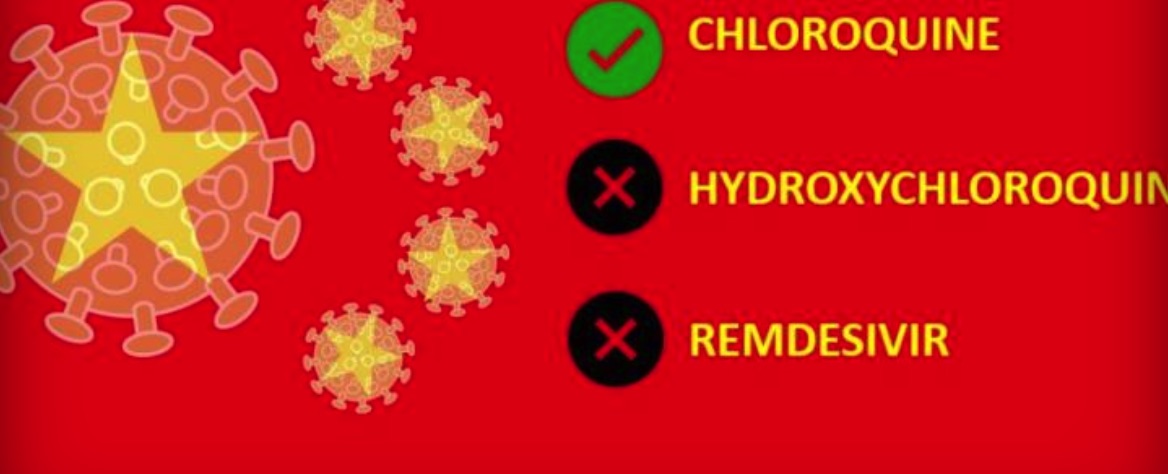Source: Archyde
China has included chloroquine in guidelines for treating Covid-19 patients. While Remdesivir, an antiviral approved by the United States, Europe and Hong Kong, is not on the updated list of recommended drugs for Covid-19.
These recommendations are part new guidelines for the treatment of Covid-19, and updated for the first time since March 3. “Some drugs may show some degree of effectiveness for treatment in observational studies, but there are no effective antiviral drugs confirmed by double-blind, placebo-controlled clinical trials,” said the National Health Commission. “The use of hydroxychloroquine, or its combined use with azithromycin, is not recommended.
But the same guidelines indicate that the chloroquine, a basic medicine identical to hydroxychloroquine (which differs by one oxygen molecule), is recommended. This is likely due to the fact that Chinese protocols with chloroquine called for a higher dosage of the drug than those with hydroxychloroquine. The effectiveness of the drug depends on the dose, so it is important to understand what the correct dosage is (we’ll talk about this later in this article).
In order to better understand the position of China, we interviewed Andrea Savarino, the Italian researcher from the Instituto Superiore di Sanità, who was the first (together with the director of the Infectious Disease Department of the “Agostino Gemelli” hospital) to be interviewed. Roberto Cauda, and Antonio Cassone, member of the American Academy of Microbiology) proposed in 2003 the use of hydroxychloroquine / Chloroquine against Sars1.
FS: What do the new Chinese guidelines provide for the use of hydroxychloroquine?
AS: For the first time, hydroxychloroquine is explicitly not recommended for the treatment of Covid-19, either alone or co-administered with azithromycin. This is probably due to the fact that there have been conflicting results in China even on the effectiveness of this drug against Covid-19. Some reported beneficial effects, others excluded them. On the other hand, they recommended a similar drug, chloroquine.
FS: Why is China banning hydroxychloroquine, but is it including the use of chloroquine in the guidelines? What are the differences between the two drugs?
AS: Chloroquine and hydroxychloroquine differ only by one oxygen atom present in hydroxychloroquine. This gives slightly different pharmacokinetic properties to the two drugs and lower long-term toxicity in the case of hydroxychloroquine. This last difference is in my opinion not relevant in the case of an acute infection such as Covid-19, because the planned treatment cycles are short, although the cardiological monitoring of patients with Covid-19 in Treatment with both drugs is strongly recommended, as cardiac toxicity events, although infrequent, can occur even during short treatment cycles.
FS: Chloroquine is therefore included in treatment protocols against Covid19 in China. Is the difference between chloroquine and hydroxychloroquine such that it can legitimize one and block the other?
AS: No, it was just a matter of approved clinical protocols. A question of formality.
FS: How is chloroquine hydroxychloroquine different in terms of pharmacokinetics? Can one be recommended in protocols and the other excluded?
AS: No, in the short-term protocols there are no major differences (as is the case with Covid-19). An oxygen molecule differentiates them, which slightly decreases penetration in some types of cells because it increases their electrical polarity. Collective hysteria, however, has further contaminated the debate on protocols relating to hydroxychloroquine. There is nothing scientific about it, but, alas, it is so. The protocol with hydroxychloroquine has also been disadvantaged by an internal American debate that has influenced academia. After Trump’s statement, journalists and politicized regulators began to campaign against hydroxychloroquine by posing as “liberal” anyone who saw it as unscientific. This detracted from the quality of the studies that supported it.
FS: Remdesivir (the drug approved by Ema) has also been excluded from Chinese guidelines, does it not work according to China?
AS: Remdesivir, according to a Chinese study published in Lancet, would not be effective in patients with Covid-19. This is probably the reason why this drug was not included in the latest guidelines.
FS: Why do other countries not reach these conclusions?
AS: Clinical trials conducted in the United States, on the other hand, would demonstrate some efficacy of the drug in the treatment of patients with Covid-19. With the United States being a scientific superpower in the Western world, many countries are relying on it to guide them in the fight against this epidemic. It is difficult to establish with certainty the reasons for the discrepancies in clinical results. One of the reasons is surely that every superpower prefers trust your own data rather than others. In addition, there have been disputes in patent related to Remdesivir between China and the United States.
FS: Dr Savarino you recently posted an article on hydroxychloroquine, what are its conclusions?
AS: The hydroxychloroquine treatment simulations that we carried out show possible virological efficacy only if the drug is administered at a sufficiently sustained dose: 600 mg per day.
FS: For the fall we probably won’t have a vaccine, and at an early pharmacological level in Europe there are no significant useful drugs. How will fall be in China instead?
AS: In the meantime, the Chinese guidelines are choosing chloroquine, and there are also other treatment options, such as ribavirin combined with lopinavir / ritonavir and interferon beta 1b. A combination of these three drugs has given good results. The effects of these drugs have already been studied at the start of the epidemic for historical reasons: China had already used similar drug combinations during the 2003 SARS epidemic.
CCP leaders are secretly taking Hydroxychloroquine to prevent COVID-19
Study: Chloroquine is a potent inhibitor of SARS coronavirus infection and spread

